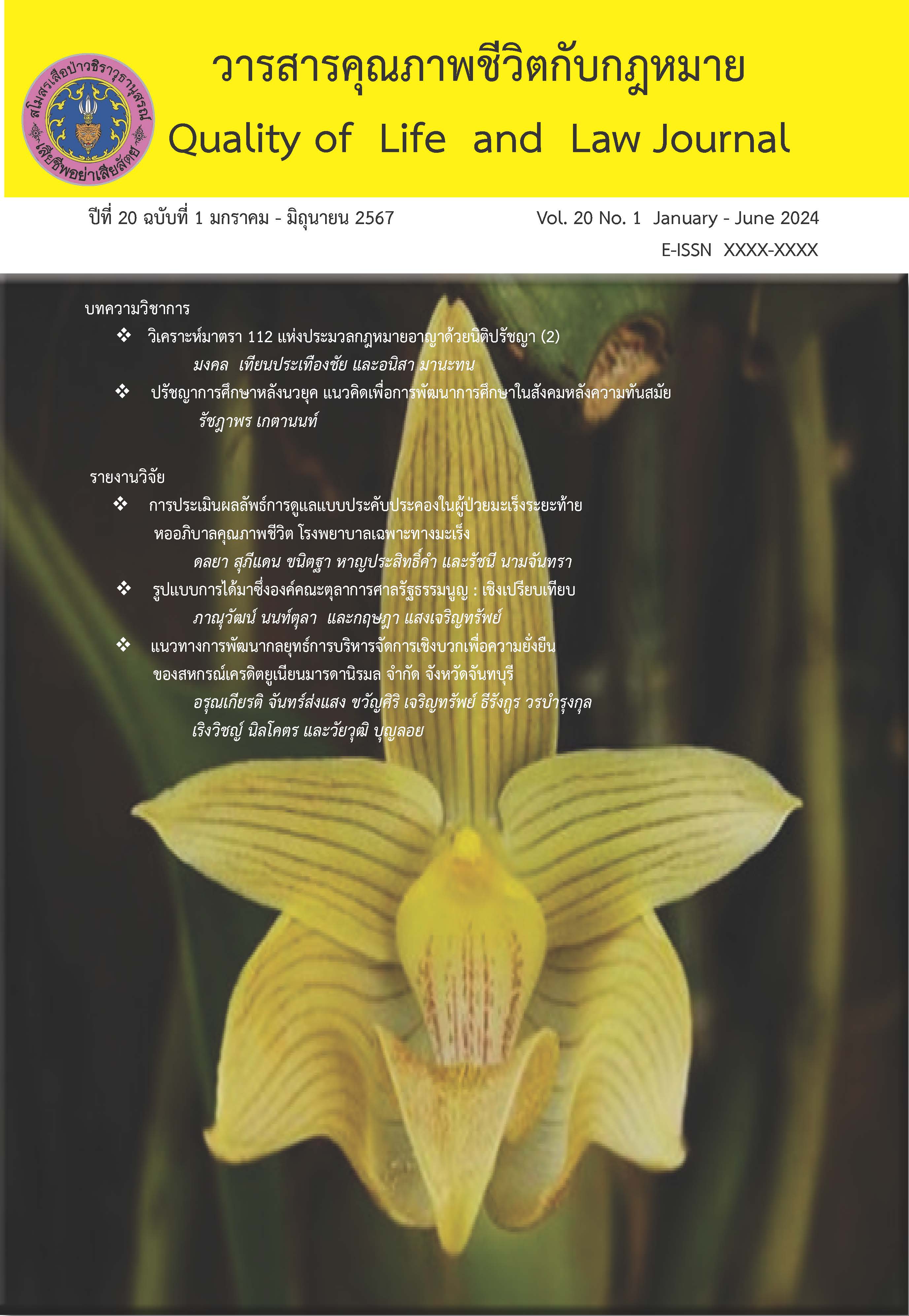Selection Process of the Constitutional Court Judges: A Comparative
Main Article Content
Abstract
This research aims to select the process of the Constitutional Court Judges and compare legal measures regarding the selection process of the Constitutional Court judges of Thailand and abroad. By researching documents, collecting data from laws, books, journals, theses, research, judgments, and constitutional judgments, such as the Constitution of the Kingdom of Thailand, B.E. 2017., and analyzing data by document analysis.
The research findings suggest that the process of selecting Constitutional Court judges is of great importance in Germany, Taiwan, and South Korea. Most of them hire individuals with expertise and proficiency in the field of law. During the selection process, the Constitutional Court chooses its judges from a pool of candidates elected by the public. Unlike Thailand, the Constitutional Court does not consider the substance of the dispute when assigning these responsibilities. Furthermore, the Senate, not elected by the public, holds the primary power to establish the judiciary of the Constitutional Court.
Research findings suggest that Thailand should revise the eligibility criteria for those serving in the Constitutional Court. As to the recent opinion of the Constitutional Court, there exists a correlation across several occupations to ensure equitable and impartial decision-making. The process for selecting Constitutional Court judges should be revised by incorporating legal measures from other countries. This would ensure that the selection process includes individuals who support the appointment of judges to the Thai Constitutional Court, who truly represent the interests of the people.
Article Details

This work is licensed under a Creative Commons Attribution-NonCommercial-NoDerivatives 4.0 International License.
- บทความหรือข้อคิดเห็นใดๆ ในวารสารคุณภาพชีวิตกับกฎหมายเป็
- กองบรรณาธิการไม่สงวนสิทธิ์
References
ก่อพงศ์ สุวรรณจูฑะ. (2563). หลักประชาธิปไตย:ว่าด้วยหลักนิติธรรมในบริบทของศาลยุติธรรมไทย. เอกสารการศึกษาอบรมหลักสูตร เรื่อง หลักนิติธรรมเพื่อประชาธิปไตย. กรุงเทพมหานคร: สำนักงานศาลรัฐธรรมนูญ.
ชัยบูรณ์ หนองคูน้อย. (2560). การยึดโยงระหว่างองค์กรศาลปกครองกับประชาชนในแนวทางการปกครองตามระบอบประชาธิปไตย [วิทยานิพนธ์ปริญญานิติศาสตรมหาบัณฑิต].มหาวิทยาลัยธรรมศาสตร์. https://ethesisarchive.library.tu.ac.th/thesis/2017/TU_2017_5701032343_8758_8866.pdf
แดนชัย ไชยวิเศษ. (2561). สมาชิกวุฒิสภา 250 คนมาอย่างไรและทำอะไร.สำนักวิชาการสำนักงานเลขาธิการสภาผู้แทนราษฎร.
พัทธนันท์ ศรสำแดง. (2560). ปัญหาทางกฎหมายเกี่ยวกับที่มาและอำนาจหน้าที่ของสมาชิกวุฒิสภา ตามรัฐธรรมนูญแห่งราชอาณาจักรไทย พุทธศักราช 2560 [ค้นคว้าอิสระปริญญานิติศาสตรมหาบัณฑิต]. มหาวิทยาลัยเกษมบัณฑิต. http://law.master.kbu.ac.th/StudentTheses/2560/04.pdf
ไพบูลย์ ชูวัฒนกิจ. (2556). หลักนิติรัฐ(เอกสารประกอบการบรรยายคณะนิติศาสตร์ LAW1303 กฎหมายมหาชนเบื้องต้น)[เอกสารที่ไม่ได้ตีพิมพ์].คณะนิติศาสตร์, มหาวิทยาลัยราชภัฏสวนสุนันทา.
สมใจ ทองกุล และ นิศาพร สุทธิมาร. (2558). งานแปลภาษาต่างประเทศและล่าม รัฐสภา, รัฐธรรมนูญสาธารณรัฐเกาหลีฉบับปัจจุบัน (ฉบับ พ.ศ. 2531) งานแปลจากภาษาเกาหลีเป็นภาษาไทย. [Constitution of the Republic of Korea, 1988], พิมพ์ครั้งที่2, กรุงเทพมหานคร: 1-24. http://www.parliament. go.th/ewtadmin/ewt/ admin_souvanee/ewt_dl_link.php?nid=6
สมคิด เลิศไพฑูรย์. (2562). อำนาจอธิปไตย(เอกสารประกอบการบรรยายคณะนิติศาสตร์ วิชากฎหมายรัฐธรรมนูญ) [เอกสารที่ไม่ได้ตีพิมพ์].คณะนิติศาสตร์,มหาวิทยาลัยธรรมศาสตร์.
สำนักวิชาการ สำนักงานเลขาธิการสภาผู้แทนราษฎร. (2562). ไต้หวันกับการป้องกันและปราบปรามการทุจริต.
https://www.parliament.go.th/ewtadmin/ewt/parliament_parcy/ewt_dl_link.php?nid=56487&filename=index
อิเลคท.(2564,11ตุลาคม). ศาลรัฐธรรมนูญกับการเมือง. https://elect.in.th/con-court
ไอลอว์.(2563, 25พฤษภาคม). เปรียบเทียบที่มาตุลาการศาลรัฐธรรมนูญหลายประเทศ ไทยยัง 'พิเศษ' ที่ให้ โควต้าข้าราชการ. https://ilaw.or.th/node/5667
Constitutional Court R.O.C. (Taiwan). (2021). Abstract Review of the Constitutionality of Statutes and Regulations. https://cons.judicial.gov.tw/en/docdata.aspx?fid=5239
Constitutional Court R.O.C. (Taiwan). (2021). Qualification & Appointment. https://cons.judicial.gov.tw/en/docdata.aspx?fid=2149


